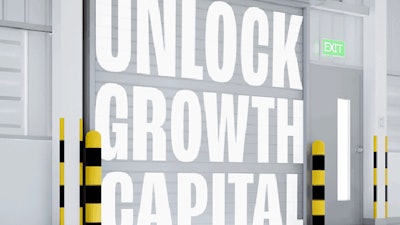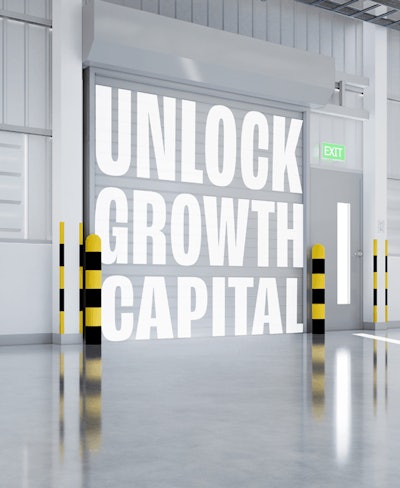

When Ted Rebholz founded Temescal Wellness, he relied on friends, family, and other private investors to finance his launch into the cannabis industry. But when it came time to expand Temescal’s vertically integrated operation in Massachusetts, rather than raising more capital just to lock it into another property, Rebholz, Temescal Wellness’s CEO, pursued a sale-leaseback deal that turned Temescal into a long-term tenant.
“Sale-leaseback transactions offer companies the opportunity to unlock the capital they have tied up in real estate and redeploy that capital into their core business, which generates higher returns than the real estate,” says Paul Smithers, president and CEO of Innovative Industrial Properties (IIP). As a real estate investment trust (REIT), IIP acts as a source of capital by acquiring a property, like Temescal’s new production facility, and then leasing it back to the operator—which instantly frees up cash flow for cannabis companies to reinvest in growth while making monthly lease payments to the buyer.
Operators increasingly are turning to leaseback transactions to fund expansion in an industry that has been cut off from traditional lending sources. In a space where “equity capital is traditionally very expensive, and debt capital is in many cases unavailable, the sale-leaseback is a logical solution for cannabis companies,” says Dave Rosenberg, CFA, principal of SLB Capital Advisors, an advisory firm focused on executing sale-leaseback deals and M&A-driven real estate engagements. “For companies looking for sources of capital to increase production, broaden their product portfolio, and invest in growth, a sale-leaseback provides the capital to do that,” Rosenberg adds.
Here’s what makes leasebacks a potential match for cash-strapped cannabis operators, with tips to navigate the nuances of these deals to ensure a smooth transaction.
The Allure of the Leaseback
Because many banks won’t lend capital to companies involved with a Schedule I controlled substance like cannabis, raising private equity is often the only funding option for entrepreneurs in this space, Smithers says. But the downside of raising equity to fund expansion is that it dilutes the existing ownership’s shares.
“We, as the owners, did not want to further dilute ourselves by having to raise equity,” Rebholz says. “That’s why a sale-leaseback was a good fit for us; it made it possible to fund a capital-intensive expansion project without any dilution.”
Whether acquiring a new location or selling an existing property, leasebacks allow companies to convert the capital that would be trapped in real estate into accessible funds that can be reinvested to expand capacity and enhance productivity.
These deals are typically structured as triple-net leases, Smithers explains, which means that “the operator is responsible for all costs associated with the property, including taxes, insurance, and utilities,” he says. “The tenant has complete control of the facility, as long as the rent and taxes are paid. We, as the landlord, have very little involvement with the tenant’s operations, so they have tremendous freedom in how they operate.”
Rebholz says he appreciates this freedom. The biggest benefit, he says, is that Temescal will retain control of its operation while enjoying the stability of a long-term landlord that can provide additional funding for further expansion along the way.
Because leaseback terms generally extend between 15 and 20 years, “that gives the operator a real sense of stability,” Smithers says. “They know what their lease payment is going to be from year to year, so there [are] no unknowns.”
While the long-term lease provides stability and predictability over time, Rebholz cautions cultivators to take the time upfront to vet potential partners before entering into a deal.
Tip 1: Vet Potential Investors.
Temescal Wellness entered Massachusetts in June 2018, just a few months before the state opened its adult-use market. As sales exploded and the state became the eighth largest regulated cannabis market in terms of sale volume by 2020, according to New Frontier Data, Rebholz instantly saw an opportunity to grow beyond his 18,000-square-foot cultivation facility that supplies the company’s three dispensaries in the Bay State.
“We had been looking for a second production site since 2019, as soon as we opened in Massachusetts, [we] realized how much demand there was,” he says. “The first step was finding a site, and that was the longest part of the process, which gave us plenty of time to [search for partners].”
Rebholz and his team “cast a wide net,” he says, talking to REITs as well as more traditional debt lenders to explore their funding options. In the past few years, he says, more REITs have entered the cannabis market as the leaseback trend has soared. “The REITs are easy to find,” he says, “and increasingly, they’re finding us.”
The first step of the vetting process, Smithers says, is evaluating the reputation of potential leaseback partners. “Make sure they have a track record of following through, and when they enter into a purchase agreement, they’re able to close it in a timely fashion—typically 60 to 90 days,” he says.
This proactive vetting process is essential to setting a solid foundation for a future transaction. “It’s like dating,” says Rebholz, who recommends starting the process at least a year or two before you plan to close. “You’re not just looking for a check; you’re entering a multi-decade relationship. It’s important to put in the time and shop around, not only for price, but to figure out who is going to be a value-added investor.”
While some REITs take a purely transactional approach, Rebholz wanted to find a leaseback investment partner with industry knowledge and experience that would add value to his operations over time. To that end, he interviewed financing firms to gauge their understanding of common cultivation equipment, technologies, and construction plans.
“You want an experienced buyer that knows the cannabis industry,” Rosenberg says. “You’re going to be partnering with this group for 10 to 20 years, so you want to make sure they get your business and understand its nuances.”
To evaluate compatibility, Rebholz puts potential partners through the “Pittsburgh Airport Test” by asking his team: “If you were on a business trip with this person and got stuck in Pittsburgh [International] Airport for seven hours, would you be able to tolerate it, or would you prefer to slowly turn rusty screws in your head?” he says. “The best possible outcome for us is not just getting funding, but having a partner at our side for years to come as we continue to innovate.”
Looking into the future is a critical component of landing the right leaseback buyer. “You want a long-term partner that can fund not only the existing building you’re looking at, but also fund potential expansion,” Rosenberg says. “You want a partner that has the capability and the capital to grow with you.”
Tip 2: Get Your Records Ready.
While interviewing potential leaseback partners, remember that they’re sizing up your operation, as well.
“This is a financial transaction, so investors will look for cash flow positive companies because they want to make sure you have the wherewithal and credit-worthiness to support consistent lease payments over a long period of time,” Rosenberg says. “A company that has proven profitability and the ability to execute will be much more attractive to sale-leaseback investors than a greener firm that’s still in its first couple of cycles.”
In addition to its history of profitability in Massachusetts, Temescal Wellness has also operated a vertically integrated cannabis business in New Hampshire since 2016. This gave Rebholz plenty of documentation to prove his team’s productivity over several harvest seasons.
“Keep your house in order [by maintaining] audited financial statements, clean corporate governance, and a spotless compliance record,” Rebholz says. “When there are spots or blemishes in compliance or accounting, just point them out proactively and explain them, rather than trying to hide them.”
In addition to financial health, the expertise of your team can reassure buyers that your company is worth the investment.
“The experience of the management team is critical,” Smithers says. “Their proven record doesn’t necessarily have to be in the cannabis space because obviously it’s such a new field, but they might have come from other industries with technical, financial, or agriscience backgrounds.”
Rebholz pulled his team into the sale-leaseback process early on, starting with Temescal’s production manager, who leveraged his construction background to guide the plans for the company’s new cultivation facility.
“Your head of production is going to take ownership and accountability for ongoing operations,” says Rebholz, who also hired a construction lawyer to assist with the process. “Having a lawyer who focuses on construction will ensure that your team has a familiarity with construction documents and a familiarity with what’s considered reasonable.”
To supplement his own financial background, Rebholz called on Temescal’s controller, as well, whose keen accounting insights and forward-looking projections were crucial throughout the diligence process.
Rosenberg recommends that companies hire a dedicated leaseback adviser to consult their team, as well. “The sale-leaseback is much more nuanced than a traditional real estate transaction,” he says, “so it’s really important to pick the right adviser who can help vet buyers to make sure a transaction is executed efficiently.”
Tip 3: Articulate Your Vision.
Beyond your financial projections, leaseback buyers need to see the long-term impact of the business they’re investing in.
“You’ve got to be able to articulate your vision,” Rebholz says. “It doesn’t have to be a grand 20-year strategy, but you need to convince [investors] that you’re not just thinking about the next harvest; you’re thinking about the next decade. Weaving in other strategic priorities, like your environmental impact, is important.”
Rebholz, for example, emphasized Temescal’s strategic initiatives—like diversity, employee retention, and sustainability—in his conversations with potential investors. He explained how LED lights and environmental controls would significantly reduce power consumption in the new facility and contribute to higher plant yields. He also talked about Temescal’s low attrition rate and described how employees started their own diversity and inclusion council several years ago.
“For a potential provider of capital, that says a lot about who we are as a company and how we take care of our people,” he says.
Although social and environmental components can be difficult to include on a balance sheet, Smithers says these initiatives are key considerations for leaseback buyers.
“We like to know what our operators are doing on the environmental and social side of their business,” he says. “As a public company, many of our investors are equally interested in these parameters because the social value of what cannabis operators bring to the community is more than just jobs and tax revenues.”

Tip 4: Reinvest in Expansion.
Because Rebholz got a head start vetting buyers several months, if not years, before finding the property for his second cultivation facility, Temescal Wellness was well-positioned to execute a smooth leaseback transaction with IIP.
In May, IIP closed on the $3.1 million acquisition of a 10-acre property in North Adams, Mass., concurrently entering a triple-net lease with Temescal Wellness as a long-term tenant. As part of the agreement, IIP will provide up to $15 million to redevelop the 70,000-square-foot industrial space into a cultivation and processing facility, for a total investment of $18.1 million.
“We’re happy to introduce some novel automation technologies here,” Rebholz says. These include LED lighting, updated automated environmental controls, and rolling benches. “We’re trying to design a facility where we’re more focused on plant health and less focused on moving plants around. It’s going to increase not just the quantity of product that we can offer to our customers, but also the quality.”
Rebholz expects the facility to be ready for inspection by the second quarter of 2022, with operations starting the following quarter.
To date, IIP has invested about $1.6 billion in the cannabis real estate industry, with a portfolio that spans “72 properties in 18 states, representing an aggregate of approximately 6.6 million rentable square feet,” Smithers says. IIP recently closed several similar leaseback transactions with Kings Garden in California, where they invested just over $76 million, and previously, a nearly $40 million leaseback deal with Green Thumb Industries in Illinois.
Rosenberg expects these types of deals to become increasingly commonplace in the cannabis industry as companies pursue new growth opportunities with limited financing options. Considering the cannabis industry’s growth in 2020 and projected double digit growth in the coming years, Rosenberg says these transactions are far more profitable for operators than having millions of dollars tied up in real estate, which historically grows by single digit percentages each year. This creates attractive capitalization rates for cultivators and their REIT partners alike, he says.
“As real estate values continue to increase,” Rosenberg says, “the sale-leaseback is going to be a more and more attractive solution for cannabis companies that need capital for exciting high-growth opportunities.”
Brooke Bilyj owns and operates Bantamedia, a national award-winning content, SEO and PR firm based in Cleveland.





















